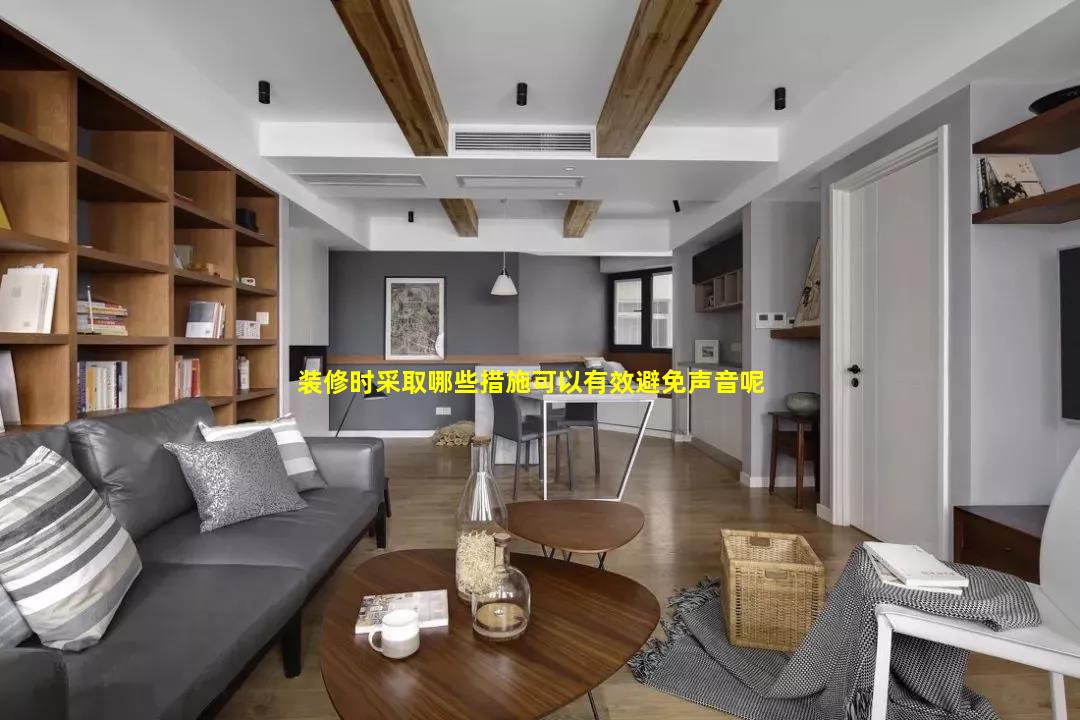





隔音棉:玻璃纤维、岩棉或聚酯纤维制成的吸音材料,可有效吸收声音。
隔音板:石膏板、胶合板或纤维水泥板等重型材料,可阻挡声音传播。
隔音毡:由橡胶、沥青或软木制成的薄膜,可减少振动和噪音。
结构设计:双层墙体:在墙体之间填充隔音材料,形成双层结构,有效阻隔声音。
浮动地板:在地板下方安装隔音垫或隔音层,减少脚步声和振动。
隔音门窗:使用双层或三层玻璃窗,并安装隔音密封条,防止声音泄漏。
声学处理:吸音板:安装在墙壁或天花板上,吸收声音并减少回声。
扩散器:将声音分散到不同方向,防止声音集中在特定区域。
共振器:吸收特定频率的声音,减少噪音。
其他措施:密封缝隙:使用填缝剂或密封胶密封墙体、地板和门窗之间的缝隙,防止声音泄漏。
减少振动:使用减震垫或隔振器,减少设备或管道产生的振动。
选择安静的家电:购买具有低噪音等级的家电,如冰箱、洗衣机和空调。
种植植物:植物可以吸收声音,有助于减少噪音。
使用白噪音:播放白噪音或自然声音,可以掩盖其他噪音。
Measures to Effectively Mitigate Sound During Home Renovations
1. Soundproofing Materials:
Acoustic panels: Absorb and dissipate sound waves, reducing reverberation and noise levels.
Soundproofing curtains: Heavy, dense fabrics block sound from entering or escaping a room.
Acoustic foam: Opencell foam absorbs and traps sound, preventing it from spreading.
2. Structural Modifications:
Doublelayer drywall: Creates an additional barrier to sound transmission.
Resilient channels: Metal channels installed between drywall layers isolate sound vibrations.
Soundproof windows and doors: Specialized windows and doors with multiple panes and seals minimize sound leakage.
3. NoiseReducing Techniques:
Carpeting and rugs: Soft surfaces absorb sound and reduce noise levels.
Acoustic ceiling tiles: Perforated tiles absorb and scatter sound, reducing reverberation.
White noise machines: Generate a constant, lowfrequency sound that masks other noises.
4. Sound Isolation:
Seal gaps and cracks: Use caulk or weatherstripping to prevent sound from leaking through openings.
Isolate noisy appliances: Place appliances on vibrationdampening pads or in soundproof enclosures.
Create sound barriers: Use furniture, plants, or screens to block sound from traveling between rooms.
5. Planning and Scheduling:
Identify noisesensitive areas: Determine which rooms require the most soundproofing.
Schedule noisy work during offhours: Avoid working during peak hours when neighbors are likely to be home.
Communicate with neighbors: Inform neighbors about the renovation schedule and any potential noise disruptions.
6. Other Considerations:
Use lownoise tools: Choose power tools with noisereducing features.
Wear ear protection: Protect your hearing from excessive noise levels.
Monitor noise levels: Use a sound level meter to ensure noise levels are within acceptable limits.

隔音棉:安装在墙壁、天花板和地板之间,吸收和阻挡声音。
隔音板:由石膏板或纤维板制成,具有隔音性能。
隔音毡:一种薄而致密的材料,可贴在墙壁或地板上以阻挡声音。
密封缝隙:门窗密封条:填补门窗周围的缝隙,防止声音泄漏。
管道和电线孔洞密封:使用泡沫或硅胶密封管道和电线穿过的孔洞。
墙面和天花板接缝密封:使用石膏或填缝剂密封墙面和天花板接缝。
吸音材料:地毯:吸收声音,减少回声。
窗帘:厚重的窗帘可以阻挡外部噪音。
软家具:沙发、扶手椅和床垫可以吸收声音。
隔音结构:双层墙:建造两层墙,中间留有空气层,可以有效隔音。
浮动地板:在地板下方安装一层隔音垫,将地板与结构隔开,减少噪音传递。
隔音门:使用具有隔音芯材和密封条的门。
其他措施:白噪音机:产生持续的背景噪音,掩盖其他噪音。
植物:植物可以吸收声音,改善室内声学。
减少噪音源:尽可能减少噪音源,例如使用静音电器或安装隔音罩。
合理布局:将卧室和书房等安静区域远离噪音源。
厚窗帘或隔音窗帘:厚重的窗帘可以吸收噪音,而隔音窗帘则专门设计用于阻挡声音。
地毯或地垫:地毯和地垫可以吸收来自地板的噪音。
隔音墙板:隔音墙板可以安装在墙壁上,以阻挡来自相邻房间或外部的噪音。
隔音门:隔音门比普通门更厚,并配有密封条,以防止噪音泄漏。
白噪音白噪音机:白噪音机产生持续的、均匀的噪音,可以掩盖装修噪音。
风扇或空调:风扇和空调产生的白噪音也可以帮助屏蔽装修噪音。
耳塞或降噪耳机
耳塞:耳塞可以插入耳朵,以阻挡大部分噪音。
降噪耳机:降噪耳机使用主动降噪技术,可以消除外部噪音。
其他方法与装修人员沟通:与装修人员沟通,了解他们的工作时间和噪音水平。
安排休息时间:在装修期间安排一些休息时间,远离噪音源。
使用耳罩:耳罩可以提供额外的噪音保护。
考虑临时搬迁:如果装修噪音严重影响您的生活,可以考虑在装修期间暂时搬迁。